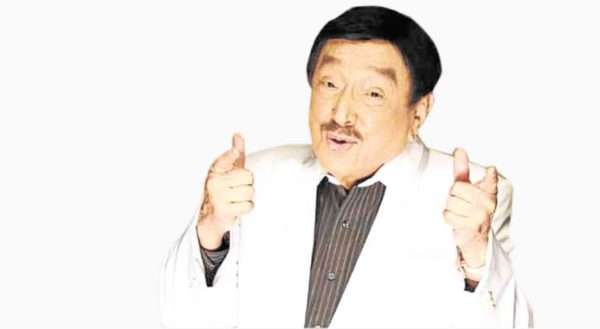
Dolphy
Our recent article on king comic Dolphy’s gay roles has turned out to be a productive side trip down movie memory lane, because it’s also reminded us of his unique gift for versatility in performance—and with it topicality in his ever-evolving choice of plots and protagonists.
Since Dolphy was a big star whose career spanned more than 50 years, he had to keep coming up with varied film fare, so his fans wouldn’t tire of him.
So, aside from his signature gay screen capers, he was always on the lookout for new plots and themes that caught viewers’ fancy, even if only temporarily.
This explains his constant interest in the new TV-film commercials of any show biz year, which he would spoof in his new film starrers, to great comedic effect.
Since commercials and their tag lines were talked and joked about offscreen, Dolphy correctly guessed that viewers would welcome spoofy references to them in his new movies, because the references made were so fresh and trendy.
In addition, Dolphy was always on the lookout for new Hollywood movies and characters that he could poke fun at, or come up with localized versions thereof.
Running backwards through his filmography, we see that this savvy penchant for riffing and spinning off from topical shows and films began really early for Dolphy, with a 1950s “filmization” of the then-hit radio program, “Mga Reyna ng Vicks.”
Later, he costarred in the film version of the komiks strip, “Kalabog en Bosyo.”
In 1960, Dolphy beat everyone else to the comic punch and punchline, when the then-new “flower power” movement was spoofed in “Beatnik” (1960).
Next, it was the turn of Tarzan of the Apes to be made fond fun of with, what else?—“Tansan, the Mighty.”
This further led to the follow-up screen gambit, “Tansan versus Tarsan.”
Then came the popularity of vampire movies in Hollywood—whereupon Dolphy trendily topbilled the local “toothy” takeoff, “Mga Manugang ni Drakula.”
Later in the decade, Dolphy latched onto the Pinoy komiks superhero fad, topbilling the film, “Captain Barbell.”
This was followed by a series of spoofs inspired by US film hits and trends, like the James Bond flicks, which resulted in a number of homegrown Agent 007 takeoffs, like “Genghis Bond, Agent 1-2-3” and “Dr. Yes.”
In addition, “Dolphy” and “Goldfinger” were idiosyncratically fused together, resulting in the big hit, “Dolpinger”!
It was so popular that it became an extended hit, with the hot-to-trot (while the iron was hot) release of its sequels—“Dolpinger: Agent sa Lagim” and “Dolpinger Meets Pantarorong” (!).
In the ’70s, Dolphy’s smart decision to “ride” on popular US films and protagonists had him shifting characters in an especially hectic way, as he went from “Scarface at Al Capone: Espiya sa Ginto,” “Operation Butterball” and “James Batman.”
This is when an “occasional” signature screen persona of his surfaces, as in the localized secret agent Dolpo, in “Dolpong Scarface” and “Dolpong Istanbul.”
Even later, another Dolphy spinoff, Ompong, makes his antic bow, in “Private Ompong and the Sexy Dozen.”
The “sexy” part of the project is the durable king comic’s acknowledgment of the nascent popularity of “bold” flicks.
Since his starrers were traditionally for the kiddie and family crowd, he could only hint at sexiness—but, he continued to profitably spoof new film trends and faves to the end of his iconic comedic career!